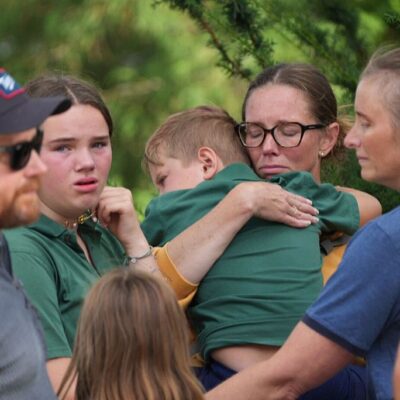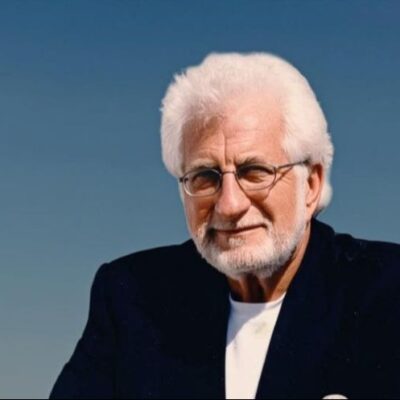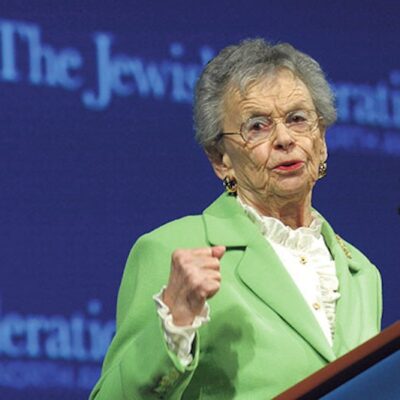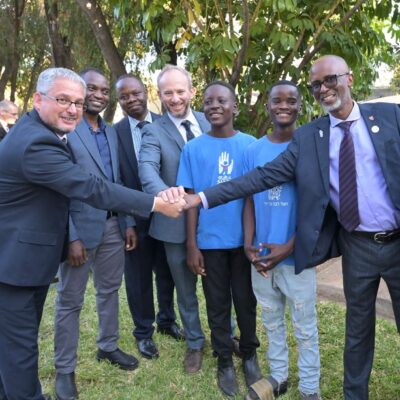FUTURE FOCUS
Jewish Agency brings ‘aliyah’ to the fore, calling it a ‘core value’ in updated mission
While immigration to Israel is a renewed focus, the organization will also focus on rebuilding northern and southern Israel, boosting Israel-Diaspora ties and Jewish engagement worldwide

Courtesy/Jewish Agency
The Jewish Agency's board chair, Mark Wilf; CEO, Yehuda Setton; and chair of the executive, Doron Almog, at the organization's Board of Governor's meeting in Jerusalem on March 2, 2025.
The Jewish Agency for Israel Board of Governors updated the 96-year-old organization’s mission during its three-day meeting in Jerusalem this week reprioritizing aliyah — Jewish immigration to Israel — as a “core value,” CEO Yehuda Setton told eJewishPhilanthropy.
In 2019, when the organization last overhauled its mission, it included in it “[providing] the global framework for aliyah.” But according to Setton, the organization has now put “aliyah on top,” seeing its role not as a mere facilitator of immigration — though it is still the body responsible for the technical aspects of aliyah — but as a far more active advocate of it. “Being ‘a platform for aliyah’ — we said, ‘No, no, no. Aliyah is a core value of the Jewish people,” Setton told eJP. “Aliyah is Zionism. Aliyah is part of us.”
Yet he stressed that the organization was dedicated not only to Israel but to the Jewish people wherever they are. “Every decision we make and action that we take has to take the Jewish people forward,” Setton said.
The other three elements of the Jewish Agency’s updated mission are: security and resilience; developing Jewish engagement and deepening connections; and ensuring that every Jewish person feels empowered to play a role in rebuilding Israel.
“We asked the people to choose the words that are the most relevant to the work of the Jewish Agency, and the two top ones by far were ‘mutual responsibility’ and ‘Israel,’” Setton said.
Mark Wilf, chair of the Board of Governors, told eJP during the group’s meeting that boosting Israel-Diaspora ties and “building peoplehood across boundaries is a huge priority for the Jewish Agency.”
To the Jewish Agency, motivated and idealistic new immigrants, olim, can play a critical role in rebuilding and re-inhabiting northern and southern Israel, as the past 16 months of war along Israel’s borders with Gaza and Lebanon have left these areas, which were already economically and socially disadvantaged, in even more dire straits. One way to do this, Setton said, is to encourage olim to come in groups with a common purpose.
This concept has a precedent in Israel, with many kibbutzim being founded by garinim, literally nuclei, of young people from abroad, such as Kibbutz Sasa near the Lebanese border, which was started in 1949 by Americans from the HaShomer Hatzair youth movement, or Kibbutz Ketura near Eilat, which was started by a group of Americans from Young Judaea in 1973.
“We will invest in group aliyah. If you want people to not just make aliyah but to take an active role [in the country], you need to create a purpose,” Setton said. “We will work with municipalities to bring groups of olim from different countries — from Latin America, from the states, from Russia — not only to integrate them into the environment but to use them as a force that will help rebuild Israel.”
Another way, Setton said, is through “lone-soldier olim,” young people who come to Israel to serve in the military without their parents. “They can also advance aliyah. They came to Israel. They can be influencers… they can help bring their friends to Israel,” he said.
In 2024, some 31,000 people made aliyah, a decrease from the roughly 47,000 who immigrated in 2023. However, these numbers are somewhat misleading as 2022 and 2023 saw a massive wave of immigration to Israel from Russia and Ukraine after Moscow launched its war against Kyiv. The number of immigrants from North America has not changed dramatically overall since the Oct. 7 terror attacks, with 3,627 people making aliyah from the U.S. and Canada last year, compared to 2,495 in 2023 and 3,351 in 2022.
The three-day Board of Governors meeting featured in-depth discussions by nearly 200 members about the future of the organization as it crafts a five-year plan that will take it to its centennial in 2029. The governors also heard speeches from top Israeli officials, including former Mossad chief Yossi Cohen and Strategic Affairs Minister Ron Dermer.
“We are talking strategically about where we’re going from here,” Wilf said.
“[That includes] supporting victims of terror, reconstruction, broadening engagement with Jewish youth worldwide,” he said, noting that the Jewish people were in the midst of “a very challenging time, perhaps our most challenging time since 1948.”
This also includes a planned expansion of the organization’s shlichut (emissary) program — a particular area of interest for Setton, who previously served as director of its shlichut department.
“We have over 2,300 shlichim, which is the largest number ever, in communities around the world, whether that’s in summer camps, in schools, JCCs. On college campuses, we have our Campus Israel Fellows,” Wilf said. “So there’s so many points of contact between Israeli young people and Diaspora young people that I think is going to be a platform for youth engagement and support for Israel.”
Setton noted that the Jewish Agency’s Fund for the Victims of Terror now supports more than 15,000 people — up from 9,000 before the Oct. 7 attacks — who were either direct victims of terror or are family members of victims. “We are all in agreement that we will continue to support it,” he said.
Setton said that in addition to continuing to support businesses in northern and southern Israel, the Jewish Agency also planned to participate physically in the reconstruction of southern Israel, preparing to “build 1,000 housing units to support the 27 kibbutzim and moshavim in the region.”
“That could bring an average of 4,000 new residents to the south. That’s a huge project. Before Passover, we expect to have a cornerstone-laying ceremony,” he said.
Setton said the Jewish Agency was also looking into other areas that it can advance reconstruction efforts in southern and northern Israel, potentially through a long-term volunteer program and through initiatives to encourage young Israelis to relocate to the regions. Both of these would require some kind of cooperation from the government, he said.
Wilf acknowledged that the Jewish Agency has ambitious plans going forward in many different areas, but said that the organization had the resources needed to take them on. “We’ve been blessed with a tremendous outpouring of support from the worldwide community, particularly in the wake of [the Oct. 7 attacks]. So fortunately we’re able to address and grow all [those] areas,” he said.
While the updated mission was approved on Tuesday, Setton said there is still much more work to be done unpacking the discussions. “There were many groups talking about the hottest topics. Everything was recorded, everything was transcribed, and now we are starting to find the major insights [using artificial intelligence software],” he said.
The Board of Governors meeting — whose theme is “The Time is Now” — also focused on the plight of the 59 hostages still being held captive in Gaza — a source of personal concern for several top Jewish Agency figures. This includes its chair, Doron Almog, who had family members murdered and taken hostage in the Oct. 7 attacks and saw one of the terrorists behind an attack that killed and maimed several of his relatives released as part of the cease-fire agreement, as well as senior staffer Dalia Cusnir, whose brother-in-law Eitan Horn is still being held captive and whose other brother-in-law Iair was released from Gaza last month.
“We are giving a huge place to this topic,” Setton said. “We feel it is our duty as Jewish people today.”
Closing the meeting, the group honored philanthropist Dr. Miriam Adelson, who has supported a number of the Jewish Agency’s initiatives, including its institute for training shlichim (emissaries) and its Israel Fellows on Campus program that sends those shlichim to universities and colleges around the world. Setton added that Adelson was also being honored for her role in advancing the cause of the hostages in Gaza among President Donald Trump.
Setton stressed the appreciation he felt for the Board of Governors, which has recently brought on a large number of new members.
“Sometimes you take it for granted that people — more than 200 people — make a decision to buy a ticket, come to Israel, sit together and think about the future of the Jewish people and Israel,” Setton said. “It is a huge privilege to be among them.”














